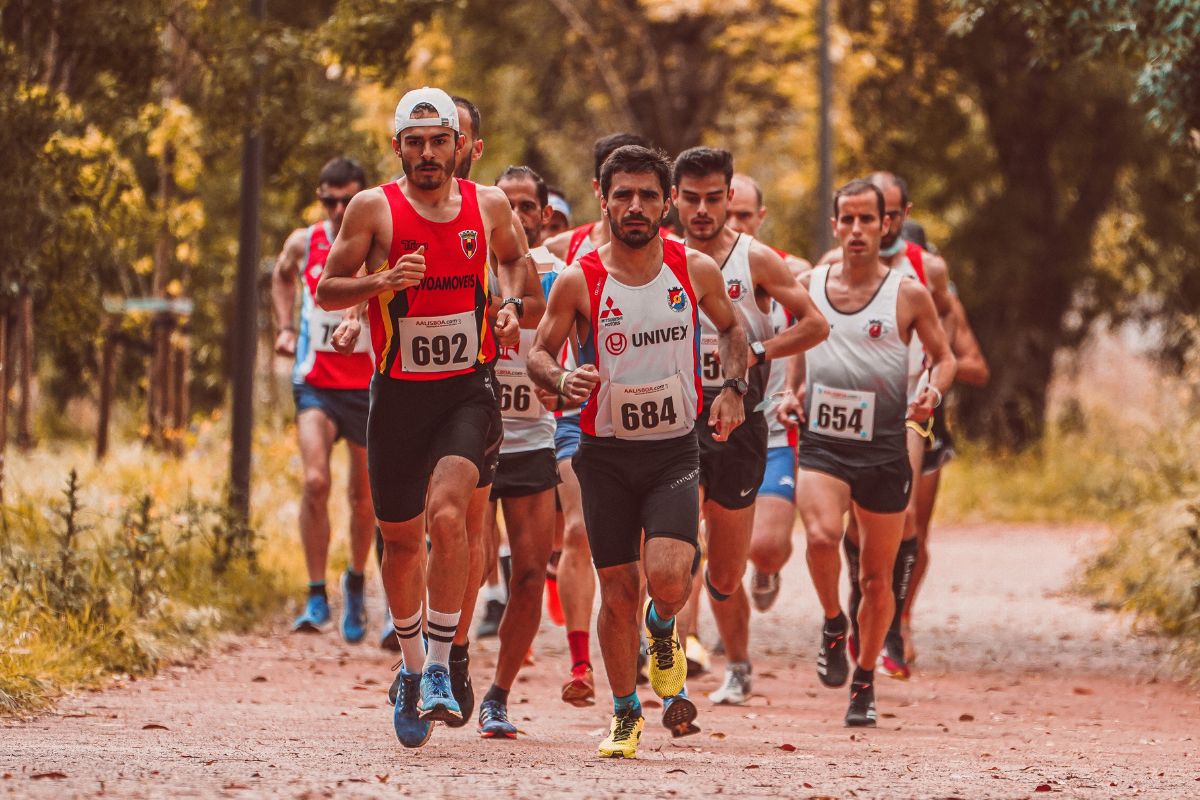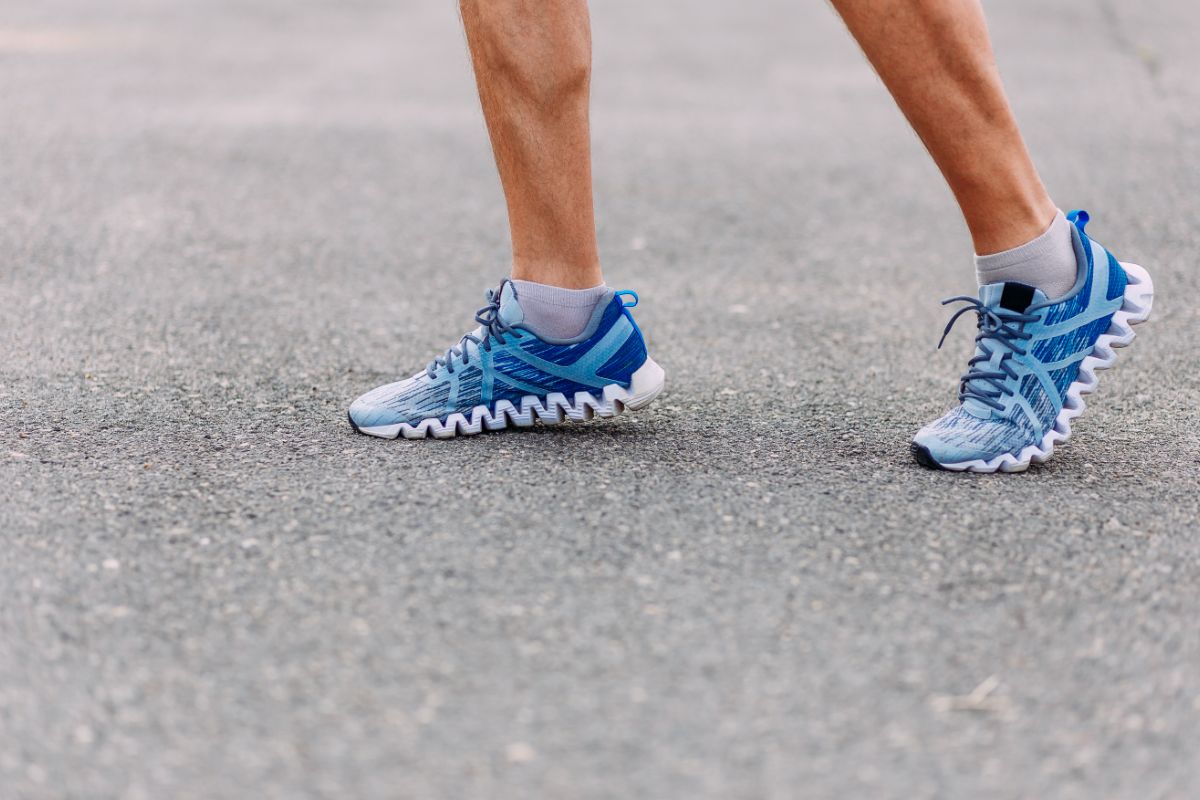When you set yourself a running goal, it helps to be confident that you can finish strong. If you are starting to feel tired at a midway point then the rest of the run may seem like a slog.
You want to enjoy running which makes stamina and endurance key traits to learn. Be consistent and over time you can learn to run for longer without getting tired.

In this guide, we will look at the ways you can improve your running endurance through preparation, training exercises, and understanding your own running style.
Before You Run
Preparation is crucial before you step out of the door to ensure you have a great run.
Create your own schedule and routine so that your mindset is correct and you know what to expect.
Get Some Rest
A lot of us suffer from sleep deprivation and it can affect your endurance, even if you run later in the day.
The difference between feeling tired and well-rested could be telling when you begin your run.
If you have suffered a poor night’s sleep your rate of perceived exertion will go up and the run will feel tougher which could be due to how the body is at producing glycogen.
With limited fuel and more stress hormones, the combination can quickly be detrimental to how your body can thermoregulate.
Fuel Up And Get Hydrated
Should you feel tired while running, it may be the case that your body is craving fuel.
For runners, this typically comes from carbohydrates which are broken down into glycogen.
This could be in the form of a banana or some peanut butter on toast which is ideal for a run that is under an hour long.
Try to eat around two hours before you plan on running and it should involve carbs like a bowl of pasta, wholewheat bread, or rice that will stock up your glycogen with enough time to digest it.
For longer runs, you may need to fuel midway through so take along some energy gels to push you through.
Though fueling up in the morning before a race is great preparation, you should look at your diet in general. Are you getting enough fruits and vegetables? Could you add some protein from lean meats?
Also, look at your hydration to make sure you do not feel tired and dehydrated before you have finished your run. You should be drinking around 16 fluid ounces of water half an hour before you run.
That’s right, almost half a liter though you may want to drink more during the run, especially if it’s hot as you will lose more water through sweat.
Keep dehydration at bay and it should help stop your muscles from cramping too which will make you feel tired.
A Caffeine Boost
Your choice of caffeine boost could come from a cup of your favorite coffee. That boost could also come from an energy drink that is designed for runners to boost their energy.
Whichever method you choose, that caffeine jolt should certainly help you run a long distance without feeling tired.
The substance should also enhance your motivation though too much can raise your heart rate to excessive levels.
Warm Up First
It cannot be overstated how important a warm-up can be. This does not have to take long or be particularly strenuous as you can create your own tailored preparation.
Try to focus on certain leg muscles, your calves, glutes, quads, and your core. Breathe through those stretches then try a brisk walk before you break into your run.

Certain dynamic stretches can really help to loosen your leg muscles and get them ready for running.
These can include hamstring sweeps, leg swings, high skips, and side shuffles.
There are also some simple running drills you can incorporate into your preparation to get the blood flowing and the heart rate up.
From butt kicks, A-skips, B-skips, and high knees, simple movements can make a big difference.
Make sure you stretch as you could quickly pull a muscle when you begin your run.
If there is one thing that can curtail a race or make you feel like you won’t finish it is picking up an injury so stretch to prevent that from happening.
This is especially good advice for a long distance so warm up your muscles then stretch, simply stretching your muscles if they are cold can cause an injury too.
Create A Motivating Playlist
If you enjoy listening to something while you run then the right music can prove really energizing.
Not only could it distract you from feeling tired, but certain songs can push you on, perhaps up a hill, though keep it at a comfortable volume so you can pay attention to the road and your surroundings.
There are even studies that indicate that music can lower your perceived fatigue by as much as 10%.
Include some of your favorite songs and some that have a strong beat that can take your focus away from your weary legs to get you to the finish line.
Breathable Clothing
Overheating can be a major factor in a runner feeling tired and that can come from the clothing they have decided to go with.
Try to wear breathable clothing so that your body temperature remains consistent and comfortable.
While you run, your body temperature can rise as much as 15°F or 8.5°C which can soon make you feel tired and cause fatigue, especially in hot weather.
Try to avoid any cotton clothing which can get wet and sticky with your own sweat or rain and then weigh you down.
Synthetic fabrics are ideally designed for exercise, especially as they wick away moisture.
If you are worried about getting cold in winter then do realize that your exertion will keep your body heat up and you can always wear another layer of synthetic fabric and a woolly hat to keep that body heat where it should be.
The Right Running Shoes
Ideally, you should not be feeling your feet while you are running.
They should simply feel comfortable though if you are wearing an uncomfortable pair of running shoes, this can swiftly become a problem.
Blisters and cuts can feel sapping and really uncomfortable, if you have to stop before the finish line then it can seem embarrassing.
The right pair of running shoes should be a perfect fit with some room for swelling, a good arch, and should be tied firmly at the ankle.
As long as your feet are comfortable, there is less likelihood of feeling any cramp and weariness that may make you want to stop.
It may be a case of trial and error before you find a pair of running shoes that you know can keep you comfortable at the end of a long run.
The distance will take its toll but that should not be on your feet. Invest in the right running shoes and they should help you run for longer without getting tired.
Training Preparation
There are various tricks you can learn while training that can build up your stamina and help you run for longer without getting tired.
Throw In Some Weight Training
Occasionally, you may want to change up your training.
While you should want to concentrate on your running, this is still a cardio workout and you could do with boosting your body strength too.
Extra muscle stretch can have a big impact on your running so try to involve certain exercises such as push-ups, lunges, squats, and deadlifts.

Make sure you can comfortably use some weights too which work effectively for your core if you do some planks and side planks.
Involve Some Sprints
To build up your cardio, you can simply add some sprints to your training runs.
That burst of speed can enhance your cardiovascular endurance to enable you to run and not get tired.
They also help bring in some variation to your training that can keep you interested, the increased effort also makes longer runs not seem as challenging.
Try sprinting up a hill for around 20 seconds, catch your breath, and then do it again. Interval training is another practice you can fit into your training routine.
By sprinting for around 50 meters, then jogging for the same distance, and repeating that about five times you can cover a distance and improve your stamina.
Change Up Your Runs
Training runs are not made to be stressful so if you feel like it is becoming more difficult than it should then change it up.
After regular running, you should know what you can class as a hard run so schedule them in but alongside an easy one.
This practice can improve your endurance by telling you and your body when to prepare to be challenged and push yourself on a hard run.
The next, easy, run you do will be a good chance to ease off and allow your legs to recover so you avoid overtraining.
Incrementally Increase The Mileage
Training plans are designed to eventually prepare yourself to cover a specific distance.
That may be for a race or a specific running goal but the key to following it is to increase your mileage incrementally.
Be honest with yourself and set the plan up so that it feels realistic to you and not overbearing.
Do not think that you can step out of the door, out of your comfort zone, and finish a marathon without following a plan for months.
You only need to increase your weekly mileage by around 10% and though it may seem like a meagre amount at first it does build and build.
Slowly but surely you will improve your endurance and your ability to cover a long distance.
The incremental growth in your weekly mileage also signals to your body that you need a bit more so it should acclimatize over time to the challenge and not result in an injury.
Track Your Distance
Of course, for you to incrementally increase your weekly mileage you will have to track the distances of each run.
You can use a fitness tracker that will note down your distance along with plenty of other bits of information including your speed and splits.
You do not need to analyze this too much but try to gauge how the running is feeling in your legs and if you feel comfortable with the recovery then great.
Tracking your progress with your distance can also help you gain confidence that you can cover longer distances and motivate yourself to do more.
During Your Run
If you have prepared well then that should make a difference but you can also make some changes while you run.
Gradually Build Your Stamina
For a beginner looking to run 5k or an advanced runner embarking on their first marathon, the crucial part of training is to build up stamina gradually.

Start slow, increase the distance yet listen to your body. As long as you stay comfortable with your own pace and do not get out of breath then that’s fine.
Getting closer to the target distance may be a challenge so try to get your pacing just right and maybe sneak in a chew or gel for a bit of refueling.
Know Your Running Form
The way you run should be comfortable for you and push you on to go further. Try to relax your shoulders and neck while keeping your chin up to remove any tension.
Keep your core muscles tight and your upper body relaxed.
There will inevitably be some movement with your arms so swing them while you run yet keep them held at a 90-degree angle by your elbow, tight to your body.
They should be moving back and forth from the shoulder for balance but also generating momentum to push you forward.
Return To Your Breathing Rhythm
Try to create markers where you feel you may need to return to your breathing rhythm.
This could be for each mile and you spend a full minute breathing through your nose and then exhaling through your mouth.
Focus on the rhythm of your breathing as a deep breath from your nose can stabilize your core and incorporate your diaphragm to keep you going.
Make sure you can breathe comfortably to get all the oxygen you need to fuel your lungs and your body.
One of the reasons you may feel tired is due to a cold or a blocked nose so try to take some decongestants beforehand to clear up those breathing paths.
Know Your Pace
You can be consistent with your running and you can also be consistent while you run.
Try to understand your pace and keep to it, this is something that you can gradually improve but at all times remain comfortable with it.
If you feel you have some fuel in the tank at the end then finish on a sprint yet knowing your body and when to push is a key skill.
Do not go all out at the start as you will quickly tire yourself out, stick to a pace that you can sustain.
Regulate your pace by running long at the rate of perceived effort, also known as RPE.
The scale runs from 1 for very light activity with hardly any exertion to 10 where it feels pretty much impossible to keep going.
Your running should be between 3 and 6 on the RPE scale for light to moderate intensity.
Look out for your shortness of breath and if your leg muscles become tired to know when to slow down and return to a comfortable pace.
Remember that the more you run, the more experienced you will be in judging what your ideal pace should be.
Knowing when to push on and when to pull back is a key skill to learn from any runner as they understand how their own body recovers during exercise.
Just because you feel fresh early on does not mean you should go full pelt and your first mile may be the slowest as your body adjusts to the movement.
Run With Others
One of the best ways to run for longer without getting tired is to run with others, perhaps with friends or by joining a running group.
You may strike up a conversation with someone and before you know it, you have gone a few miles without really feeling it.
Other runners could also give you some tips on how to improve your endurance that you had not already thought of.
There could also be a defined route that you are not aware of the distance, only when you finish can you find out how far you went and you may be pleasantly surprised.
Then there is the encouragement that other runners can offer you, especially during a race.
Just when you need a boost you may hear a cheer and suddenly have the adrenaline to finish strong, they may also offer sweets for refueling.
In an organized race, you may want to finish ahead of someone in particular or beat a PB and there can be no better encouragement than that to put aside thoughts of feeling tired.
Frequently Asked Questions
Why May I Get Tired While Running?
Every individual is different yet some consistent factors affect each runner’s level of exhaustion.
For one, there is your own endurance capacity which is how long a body can keep going until it gets tired.
The condition is complex and involves your musculoskeletal endurance, mitochondrial levels, aerobic capacity, and lactate threshold.
Then there is simply the type of running you are doing, you can quickly get tired running up a steep hill whereas on a long stretch of flat road it can seem a lot easier.
Finally, there is your own conditioning. If you leave the house for a run feeling stressed, overfed, distracted, and already tired then that will play a role in your running.
You may soon find yourself getting tired if you already feel overwhelmed, the extra effort may seem too much. Especially if you have not fueled up beforehand.
What Food Should Runners Not Eat?
Fueling is important for runners and getting the right food into their system in good time is crucial.
However, there are certain foods that a runner should steer clear of if they want to look after themselves and their running performance.
This can include beverages such as alcohol and sugary sodas. Dairy products may not sit easily on the stomach, as is the case for oily, fatty, and spicy food.
Final Thoughts
If there is one overarching tip to run for longer without getting tired it is to remain consistent.
Only you know how your body is feeling so if you can push harder then do it but if your legs feel weary then it may be time for refueling.
Stick to a training plan and only look at increasing your weekly mileage by around 10%. Any more and you may be pushing too hard and inviting on injuries that you really do not want.
- Can Dogs Run Faster Than Humans? (Running With Your Furry Friend) - October 4, 2022
- 10 Doggie Fun Runs You Will Love [Ultimate Guide] - October 4, 2022
- What Are Division Results In Running? - October 4, 2022








